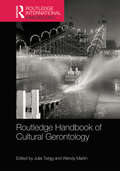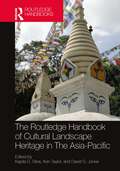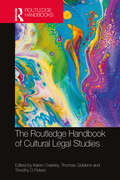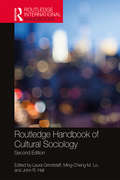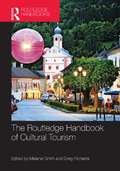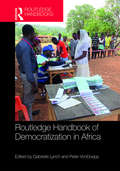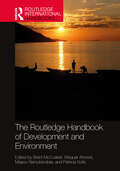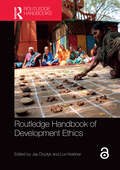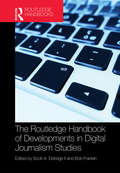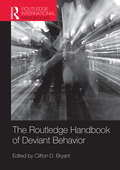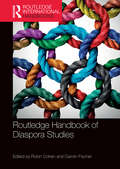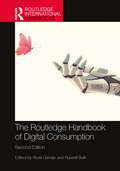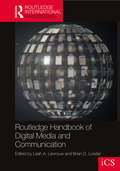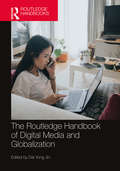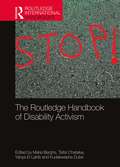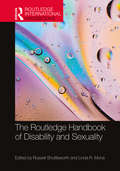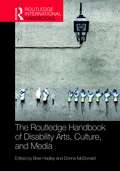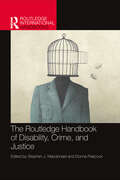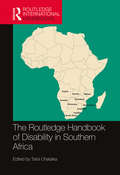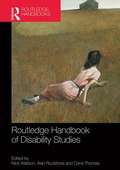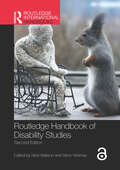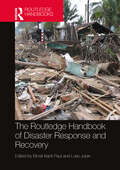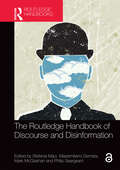- Table View
- List View
Routledge Handbook of Cultural Gerontology (Routledge International Handbooks)
by Julia Twigg Wendy MartinLater years are changing under the impact of demographic, social and cultural shifts. No longer confined to the sphere of social welfare, they are now studied within a wider cultural framework that encompasses new experiences and new modes of being. Drawing on influences from the arts and humanities, and deploying diverse methodologies – visual, literary, spatial – and theoretical perspectives Cultural Gerontology has brought new aspects of later life into view. This major new publication draws together these currents including: Theory and Methods; Embodiment; Identities and Social Relationships; Consumption and Leisure; and Time and Space. Based on specially commissioned chapters by leading international authors, the Routledge Handbook of Cultural Gerontology will provide concise authoritative reviews of the key debates and themes shaping this exciting new field.
The Routledge Handbook of Cultural Landscape Heritage in The Asia-Pacific (Routledge Handbooks on Museums, Galleries and Heritage)
by Ken Taylor David S. Jones Kapila D. SilvaThe Routledge Handbook of Cultural Landscape Heritage in the Asia-Pacific revisits the use, growth, and potential of the cultural landscape methodology in the conservation and management of culture-nature heritage in the Asia-Pacific region. Taking both a retrospective and prospective view of the management of cultural heritage in the region, this volume argues that the plurality and complexity of heritage in the region cannot be comprehensively understood and effectively managed without a broader conceptual framework like the cultural landscape approach. The book also demonstrates that such an approach facilitates the development of a flexible strategy for heritage conservation. Acknowledging the effects of rapid socio-economic development, globalization, and climate change, contributors examine the pressure these issues place on the sustenance of cultural heritage. Including chapters from more than 20 countries across the Asia-Pacific region, the volume reviews the effectiveness of theoretical and practical potentials afforded by the cultural landscape approach and examines how they have been utilized in the Asia-Pacific context for the last three decades. The Routledge Handbook of Cultural Landscape Heritage in the Asia-Pacific provides a comprehensive analysis of the processes of cultural landscape heritage conservation and management. As a result, it will be of interest to academics, students, and professionals who are based in the fields of cultural heritage management, architecture, urban planning, landscape architecture, and landscape management.
The Routledge Handbook of Cultural Legal Studies
by Karen Crawley Thomas Giddens Timothy D PetersThis handbook provides a comprehensive introduction to the cutting-edge field of cultural legal studies.Cultural legal studies is at the forefront of the legal discipline, questioning not only doctrine or social context, but how the concerns of legality are distributed and encountered through a range of material forms. Growing out of the interdisciplinary turn in critical legal studies and jurisprudence that took place in the latter quarter of the 20th century, cultural legal studies exists at the intersection of a range of traditional disciplinary areas: legal studies, cultural studies, literary studies, jurisprudence, media studies, critical theory, history, and philosophy. It is an area of study that is characterised by an expanded or open-ended conception of what ‘counts’ as a legal source, and that is concerned with questions of authority, legitimacy, and interpretation across a wide range of cultural artefacts. Including a mixture of established and new authors in the area, this handbook brings together a complex set of perspectives that are representative of the current field, but which also address its methods, assumptions, limitations, and possible futures.Establishing the significance of the cultural for understanding law, as well as its importance as a potential site for justice, community, and sociality in the world today, this handbook is a key reference point both for those working in the cultural legal context – in legal theory, law and literature, law and film/television, law and aesthetics, cultural studies, and the humanities generally – as well as others interested in the interactions between authority, culture, and meaning.
Routledge Handbook of Cultural Sociology: 2nd Edition (Routledge International Handbooks)
by Laura Grindstaff Ming-Cheng M. Lo John R. HallThe thoroughly revised and updated second edition of the Routledge Handbook of Cultural Sociology provides an unparalleled overview of sociological and related scholarship on the complex relations of culture to social structures and everyday life. With 70 essays written by scholars from around the world, the book brings diverse approaches into dialogue, charting new pathways for understanding culture in our global era. Short, accessible chapters by contributing authors address classic questions, emergent issues, and new scholarship on topics ranging from cultural and social theory to politics and the state, social stratification, identity, community, aesthetics, and social and cultural movements. In addition, contributors explore developments central to the constitution and reproduction of culture, such as power, technology, and the organization of work. This handbook is essential reading for undergraduate and postgraduate students interested in a wide range of subfields within sociology, as well as cultural studies, media and communication, and postcolonial theory.
The Routledge Handbook of Cultural Tourism
by Melanie Smith Greg RichardsThe Routledge Handbook of Cultural Tourism explores and critically evaluates the debates and controversies in this field of Tourism. It brings together leading specialists from a range of disciplinary backgrounds and geographical regions, to provide state-of-the-art theoretical reflection and empirical research on this significant stream of tourism and its future direction.The book is divided into 7 inter-related sections. Section 1 looks at the historical, philosophical and theoretical framework for cultural tourism. This section debates tourist autonomy role play, authenticity, imaginaries, cross-cultural issues and inter-disciplinarity Section 2 analyses the role that politics takes in cultural tourism. This section also looks at ways in which cultural tourism is used as a policy instrument for economic development. Section 3 focuses on social patterns and trends, such as the mobilities paradigm, performativity, reflexivity and traditional hospitality, as well as considering sensitive social issues such as dark tourism. Section 4 analyses community and development, exploring adaptive forms of cultural tourism, as well as more sustainble models for indigenous tourism development. Section 5 discusses Landscapes and Destinations, including the transformation of space into place, issues of authenticity in landscape, the transformation of urban and rural landscapes into tourism products and conservation versus development dilemmas. Section 6 refers to Regeneration and Planning, especially the creative turn in cultural tourism, which can be used to avoid problems of serial reproduction, standardisation and homogenisation. Section 7 deals with The Tourist and Visitor Experience, emphasising the desire of tourists to be more actively and interactively engaged in cultural tourism. This significant volume offers the reader a comprehensive synthesis of this field, conveying the latest thinking and research. The text is international in focus, encouraging dialogue across disciplinary boundaries and areas of study and will be an invaluable resource for all those with an interest in Cultural Tourism.This is essential reading for students, researchers and academics of Tourism as well as those of related studies in particular Cultural Studies, Leisure, Geography, Sociology, Politics and Economics.
Routledge Handbook of Democratization in Africa
by Gabrielle Lynch Peter VondoeppThis volume explores the issues and debates surrounding the ongoing processes of democratization in sub-Saharan Africa, illuminating the central dynamics characterizing Africa’s democratic experiments, and considering the connections between democratization and economic, social, and cultural developments on the continent. Reflecting the diverse and rich nature of this field of study, the Handbook of Democratization in Africa features more than thirty contributions structured into six thematic sections: The politics and paths of regime development Institutional dynamics Political mobilization and voting dynamics The politics of identity Social forces from below The consequences of democracy. Chapters offer overviews of the key scholarship on particular topics, including central insights from the latest research, and provide suggestions for those interested in further inquiry. The material includes attention to broad cross-continental patterns, for example with respect to public opinion, political violence, or the role of different institutions and actors. It also includes rich case material, drawing on and highlighting the experiences of a diverse collection of countries. Encouraging a comprehensive view of key concerns and enhancing understanding of particular issues, the Handbook of Democratization in Africa represents a critical resource for experts and students of African politics, democratization, and African studies.
The Routledge Handbook of Development and Environment (Routledge International Handbooks)
by Brent McCusker Waquar Ahmed Maano Ramutsindela Patricia SolísThe handbook seeks to illuminate the key concepts in the study of development-environment through showcasing some of the Majoritarian (formerly "Developing") world’s emerging scholars in order to explore theoretical connections through critical/radical theory, “small” theory, various conceptual frameworks, and non-Western and subaltern viewpoints. The volume examines the themes around the study of the relationship between economic and social development and the environment. Part 1 covers theoretical and conceptual approaches to the study of development and environment by examining the diverse ways in which people perceive, understand, and act upon the world around them. Cross-scalar topics such as neo-liberalism and globalization, human rights, climate change, sustainability, and technology are covered in Part 2. The book shifts to examinations of resources and production in Part 3, where authors with a focus on one or more environmental resources or types of economic production are presented. Topics range from water, agriculture, and food, to energy, bioeconomy, and mining. The fourth section presents chapters where people are at the center of the development-environment nexus through topics such as gender relations, children, health, and cities. Finally, policy and governance of development and environment are explored in Part 5. The section includes both academics and practitioners who have worked with policy makers and are policy makers themselves. The book is primarily intended for scholars and graduate students in geography, environmental studies, and development studies for whom it will provide an invaluable and up-to-date guide to current thinking across the range of disciplines, which converge in the study of development and environment.
Routledge Handbook of Development Ethics
by Lori Keleher Jay DrydykThe Routledge Handbook of Development Ethics provides readers with insight into the central questions of development ethics, the main approaches to answering them, and areas for future research. Over the past seventy years, it has been argued and increasingly accepted that worthwhile development cannot be reduced to economic growth. Rather, a number of other goals must be realised: • Enhancement of people's well-being • Equitable sharing in benefits of development • Empowerment to participate freely in development • Environmental sustainability • Promotion of human rights • Promotion of cultural freedom, consistent with human rights • Responsible conduct, including integrity over corruption Agreement that these are essential goals has also been accompanied by disagreements about how to conceptualize or apply them in different cases or contexts. Using these seven goals as an organizing principle, this handbook presents different approaches to achieving each one, drawing on academic literature, policy documents and practitioner experience. This international and multi-disciplinary handbook will be of great interest to development policy makers and program workers, students and scholars in development studies, public policy, international studies, applied ethics and other related disciplines.
The Routledge Handbook of Developments in Digital Journalism Studies (Routledge Media and Cultural Studies Handbooks)
by Scott Eldridge II Bob FranklinThe Routledge Handbook of Developments in Digital Journalism Studies offers a unique and authoritative collection of essays that report on and address the significant issues and focal debates shaping the innovative field of digital journalism studies. In the short time this field has grown, aspects of journalism have moved from the digital niche to the digital mainstay, and digital innovations have been ‘normalized’ into everyday journalistic practice. These cycles of disruption and normalization support this book’s central claim that we are witnessing the emergence of digital journalism studies as a discrete academic field. Essays bring together the research and reflections of internationally distinguished academics, journalists, teachers, and researchers to help make sense of a reconceptualized journalism and its effects on journalism’s products, processes, resources, and the relationship between journalists and their audiences. The handbook also discusses the complexities and challenges in studying digital journalism and shines light on previously unexplored areas of inquiry such as aspects of digital resistance, protest, and minority voices. The Routledge Handbook of Developments in Digital Journalism Studies is a carefully curated overview of the range of diverse but interrelated original research that is helping to define this emerging discipline. It will be of particular interest to undergraduate and postgraduate students studying digital, online, computational, and multimedia journalism.
Routledge Handbook of Deviant Behavior (Routledge International Handbooks)
by Clifton D. BryantThe Handbook of Deviant Behavior presents a comprehensive, integrative, and accessible overview of the contemporary body of knowledge in the field of social deviance in the twenty-first century. This book addresses the full range of scholarly concerns within this area – including theoretical, methodological, and substantive issues – in over seventy original entries, written by an international mix of recognized scholars. Each of these essays provides insight not only into the historical and sociological evolution of the topic addressed, but also highlights associated notable thinkers, research findings, and key published works for further reference. As a whole, this Handbook undertakes an in depth evaluation of the contemporary state of knowledge within the area of social deviance, and beyond this considers future directions and concerns that will engage scholars in the decades ahead. The inclusion of comparative and cross-cultural examples and discussions, relevant case studies and other pedagogical features make this book an invaluable learning tool for undergraduate and post graduate students in disciplines such as criminology, mental health studies, criminal theory, and contemporary sociology.
Routledge Handbook of Diaspora Studies (Routledge International Handbooks)
by Robin CohenThe word ‘diaspora’ has leapt from its previously confined use – mainly concerned with the dispersion of Jews, Greeks, Armenians and Africans away from their natal homelands – to cover the cases of many other ethnic groups, nationalities and religions. But this ‘horizontal’ scattering of the word to cover the mobility of many groups to many destinations, has been paralleled also by ‘vertical’ leaps, with the word diaspora being deployed to cover more and more phenomena and serve more and more objectives of different actors. With sections on ‘debating the concept’, ‘complexity’, ‘home and home-making’, ‘connections’ and ‘critiques’, the Routledge Handbook of Diaspora Studies is likely to remain an authoritative reference for some time. Each contribution includes a targeted list of references for further reading. The editors have carefully blended established scholars of diaspora with younger scholars looking at how diasporas are constructed ‘from below’. The adoption of a variety of conceptual perspectives allows for generalization, contrasts and comparisons between cases. In this exciting and authoritative collection over 40 scholars from many countries have explored the evolving use of the concept of diaspora, its possibilities as well as its limitations. This Handbook will be indispensable for students undertaking essays, debates and dissertations in the field.
The Routledge Handbook of Digital Consumption (Routledge International Handbooks)
by Russell Belk Rosa LlamasSince the publication of the ground-breaking first edition, there has been an exponential growth in research and literature about the digital world and its enormous potential benefits and threats. Fully revised and updated, this new edition brings together an expertly curated and authoritative overview of the impact and emerging horizons of digital consumption. Divided into sections, it addresses key topics including digital entertainment, self-representation, communication, Big Data, digital spirituality, online surveillance, and algorithmic advertising. It explores developments such as consumer data collection techniques, peer-to-peer payment systems, augmented reality, and AI-enhanced consumer well-being, as well as digital transgression, secrecy, crypto-currencies, NFTs, and cultural concerns such as the spread of conspiracy theories and fake news. From digital influencers, digital nomads, and digital neo-tribalism to robots and cyborgs, it explores existences that blur boundaries between humans and machines, reality and the metaverse, and the emerging "technoculture" – a state of all-encompassing digital being. This unique volume is an essential resource for scholars, practitioners, and policy makers, and will continue to provide a new generation of readers with a deep understanding of the universe of digital consumption.
Routledge Handbook of Digital Media and Communication (Routledge International Handbooks)
by Leah A. Lievrouw Brian D. LoaderWhat are we to make of our digital social lives and the forces that shape it? Should we feel fortunate to experience such networked connectivity? Are we privileged to have access to unimaginable amounts of information? Is it easier to work in a digital global economy? Or is our privacy and freedom under threat from digital surveillance? Our security and welfare being put at risk? Our politics undermined by hidden algorithms and misinformation? Written by a distinguished group of leading scholars from around the world, the Routledge Handbook of Digital Media and Communication provides a comprehensive, unique, and multidisciplinary exploration of this rapidly growing and vibrant field of study. The Handbook adopts a three-part structural framework for understanding the sociocultural impact of digital media: the artifacts or physical devices and systems that people use to communicate; the communicative practices in which they engage to use those devices, express themselves, and share meaning; and the organizational and institutional arrangements, structures, or formations that develop around those practices and artifacts. Comprising a series of essay-chapters on a wide range of topics, this volume crystallizes current knowledge, provides historical context, and critically articulates the challenges and implications of the emerging dominance of the network and normalization of digitally mediated relations. Issues explored include the power of algorithms, digital currency, gaming culture, surveillance, social networking, and connective mobilization. More than a reference work, this Handbook delivers a comprehensive, authoritative overview of the state of new media scholarship and its most important future directions that will shape and animate current debates.
The Routledge Handbook of Digital Media and Globalization
by Dal Yong JinIn this comprehensive volume, leading scholars of media and communication examine the nexus of globalization, digital media, and popular culture in the early 21st century. The book begins by interrogating globalization as a critical and intensely contested concept, and proceeds to explore how digital media have influenced a complex set of globalization processes in broad international and comparative contexts. Contributors address a number of key political, economic, cultural, and technological issues relative to globalization, such as free trade agreements, cultural imperialism, heterogeneity, the increasing dominance of American digital media in global cultural markets, the powers of the nation-state, and global corporate media ownership. By extension, readers are introduced to core theoretical concepts and practical ideas, which they can apply to a broad range of contemporary media policies, practices, movements, and technologies in different geographic regions of the world—North America, Europe, Africa, the Middle East, Latin America, and Asia. Scholars of global media, international communication, media industries, globalization, and popular culture will find this to be a singular resource for understanding the interconnected relationship between digital media and globalization.
The Routledge Handbook of Disability Activism (Routledge International Handbooks)
by Maria Berghs Tsitsi Chaitaka Yayha El-Lahib Andrew DubeThe onslaught of neoliberalism, austerity measures and cuts, impact of climate change, protracted conflicts and ongoing refugee crisis, rise of far right and populist movements have all negatively impacted on disability. Yet, disabled people and their allies are fighting back and we urgently need to understand how, where and what they are doing, what they feel their challenges are and what their future needs will be. This comprehensive handbook emphasizes the importance of everyday disability activism and how activists across the world bring together a wide range of activism tactics and strategies. It also challenges the activist movements, transnational and emancipatory politics, as well as providing future directions for disability activism. With contributions from senior and emerging disability activists, academics, students and practitioners from around the globe, this handbook covers the following broad themes: • Contextualising disability activism in global activism • Neoliberalism and austerity in the global North • Rights, embodied resistance and disability activism • Belonging, identity and values: how to create diverse coalitions for rights • Reclaiming social positions, places and spaces • Social media, support and activism • Campus activism in higher education • Inclusive pedagogies, evidence and activist practices • Enabling human rights and policy • Challenges facing disability activism The Routledge Handbook of Disability Activism provides disability activists, students, academics, practitioners, development partners and policy makers with an authoritative framework for disability activism.
The Routledge Handbook of Disability and Sexuality (Routledge International Handbooks)
by Russell Shuttleworth and Linda R. MonaThis handbook provides a much-needed holistic overview of disability and sexuality research and scholarship. With authors from a wide range of disciplines and representing a diversity of nationalities, it provides a multi-perspectival view that fully captures the diversity of issues and outlooks. Organised into six parts, the contributors explore long-standing issues such as the psychological, interpersonal, social, political and cultural barriers to sexual access that disabled people face and their struggle for sexual rights and participation. The volume also engages issues that have been on the periphery of the discourse, such as sexual accommodations and support aimed at facilitating disabled people's sexual well-being; the socio-sexual tensions confronting disabled people with intersecting stigmatised identities such as LGBTBI or asexual; and the sexual concerns of disabled people in the Global South. It interrogates disability and sexuality from diverse perspectives, from more traditional psychological and sociological models, to various subversive and post-theoretical perspectives and queer theory. This handbook examines the cutting-edge, and sometimes ethically contentious, concerns that have been repressed in the field. With current, international and comprehensive content, this book is essential reading for students, academics and researchers in the areas of disability, gender and sexuality, as well as applied disciplines such as healthcare practitioners, counsellors, psychology trainees and social workers.
The Routledge Handbook of Disability Arts, Culture, and Media
by Bree Hadley Donna McDonaldIn the last 30 years, a distinctive intersection between disability studies – including disability rights advocacy, disability rights activism, and disability law – and disability arts, culture, and media studies has developed. The two fields have worked in tandem to offer critique of representations of disability in dominant cultural systems, institutions, discourses, and architecture, and develop provocative new representations of what it means to be disabled. Divided into 5 sections: Disability, Identity, and Representation Inclusion, Wellbeing, and Whole-of-life Experience Access, Artistry, and Audiences Practices, Politics and the Public Sphere Activism, Adaptation, and Alternative Futures this handbook brings disability arts, disability culture, and disability media studies – traditionally treated separately in publications in the field to date – together for the first time. It provides scholars, graduate students, upper level undergraduate students, and others interested in the disability rights agenda with a broad-based, practical and accessible introduction to key debates in the field of disability art, culture, and media studies. An internationally recognised selection of authors from around the world come together to articulate the theories, issues, interests, and practices that have come to define the field. Most critically, this book includes commentaries that forecast the pressing present and future concerns for the field as scholars, advocates, activists, and artists work to make a more inclusive society a reality.
The Routledge Handbook of Disability, Crime, and Justice (Routledge International Handbooks)
by Stephen J. Macdonald Donna PeacockOffering an interdisciplinary exploration of the complex relationships between disability, crime, and victimisation, this comprehensive handbook gathers insights from leading scholars across diverse fields, including disability studies, criminology, history, sociology, forensic psychology, forensic psychiatry, and the neurosciences, who have conducted extensive research in these areas.Adopting a global perspective, this volume applies various theoretical frameworks to explore the experiences of diverse disabled communities, including those with mental health issues, neurodiversity, sensory impairments, and physical disabilities, as they interact with the criminal justice system. It also presents contemporary perspectives on crime and victimisation, encompassing biomedical, biopsychosocial, structural, cultural, and realist approaches, and in doing so it delves into critical issues, including marginalisation, discrimination, exclusion, and intersectionality, while also addressing the inherent disablism and ableism apparent in the justice system. Divided into five comprehensive sections – Introduction to the Routledge International Handbook of Disability, Crime, and Justice; Histories of Disability and Crime; Biomedical and Biopsychosocial Criminology; Structural Disability Criminology; Cultural Disability Criminology; and Realist Disability Criminology, this groundbreaking publication covers a wide range of topics. These include disability theory, penal populations, community interventions, policing, probation, courts, prisons, hate crimes, interpersonal victimisation, domestic violence, sex work, marginalisation, deviance, media representations, and systemic ableism/disablism within the justice system.The Routledge Handbook of Disability, Crime, and Justice stands as a definitive guide to disability, crime, and justice and will be of value to all those with an interest in this area.
The Routledge Handbook of Disability in Southern Africa
by Tsitsi ChataikaThis comprehensive ground-breaking southern African-centred collection spans the breadth of disability research and practice. Reputable and emerging scholars, together with disability advocates adopt a critical and interdisciplinary stance to prove, challenge and shift commonly held social understanding of disability in traditional discourses, frontiers and practices in prominent areas such as inter/national development, disability studies, education, culture, health, religion, gender, sports, tourism, ICT, theatre, media , housing and legislation. This handbook provides a body of interdisciplinary analyses suitable for the development of disability studies in southern Africa. Through drawing upon and introducing resources from several disciplines, theoretical perspectives and personal narratives from disability activists, it reflects on disability and sustainable development in southern Africa. It also addresses a clear need to bring together interdisciplinary perspectives and narratives on disability and sustainable development in ways that do not undermine disability politics advanced by disabled people across the world. The handbook further acknowledges and builds upon the huge body of literature that understands the social, cultural, educational, psychological, economic, historical and political facets of the exclusion of disabled people. The handbook covers the following broad themes: • Disability inclusion, ICT and sustainable development • Access to education, from early childhood development up to higher education • Disability, employment, entrepreneurship and community-based rehabilitation • Religion, gender and parenthood • Tourism, sports and accessibility • Compelling narratives from disability activists on societal attitudes toward disability, media advocacy, accessible housing and social exclusion. Thus, this much-awaited handbook provides students, academics, practitioners, development partners, policy makers and activists with an authoritative framework for critical thinking and debates that inform policy and practice in incomparable ways, with the view to promoting inclusive and sustainable development.
Routledge Handbook of Disability Studies
by Carol Thomas Nick Watson Alan RoulstoneThe Routledge Handbook of Disability Studies takes a multidisciplinary approach to disability and provides an authoritative and up-to-date overview of the main issues in the field around the world today. Adopting an international perspective and consisting entirely of newly commissioned chapters arranged thematically, it surveys the state of the discipline, examining emerging and cutting edge areas as well as core areas of contention. Divided in five sections, this comprehensive handbook covers: different models and approaches to disability how key impairment groups have engaged with disability studies and the writings within the discipline policy and legislation responses to disability studies and to disability activism disability studies and its interaction with other disciplines, such as history, philosophy and science and technology studies disability studies and different life experiences, examining how disability and disability studies intersects with ethnicity, sexuality, gender, childhood and ageing. Containing chapters from an international selection of leading scholars, this authoritative handbook is an invaluable reference for all academics, researchers and more advanced students in disability studies and associated disciplines such as sociology, health studies and social work.
Routledge Handbook of Disability Studies
by Nick Watson Simo VehmasThis fully revised and expanded second edition of the Routledge Handbook of Disability Studies takes a multidisciplinary approach to disability and provides an authoritative and up-to-date overview of the main issues in the field around the world today. Adopting an international perspective and arranged thematically, it surveys the state of the discipline, examining emerging and cutting-edge areas as well as core areas of contention. Divided in five parts, this comprehensive handbook covers: Different models and approaches to disability. How key impairment groups have engaged with disability studies and the writings within the discipline. Policy and legislation responses to disability studies and to disability activism. Disability studies and its interaction with other disciplines, such as history, philosophy, sport, and science and technology studies. Disability studies and different life experiences, examining how disability and disability studies intersects with ethnicity, sexuality, gender, childhood and ageing. Containing 15 revised chapters and 12 new chapters from an international selection of leading scholars, this authoritative handbook is an invaluable reference for all academics, researchers, and more advanced students in disability studies and associated disciplines such as sociology, health studies and social work.
Routledge Handbook of Disability Studies
by Nick Watson Simo VehmasThis fully revised and expanded second edition of the Routledge Handbook of Disability Studies takes a multidisciplinary approach to disability and provides an authoritative and up-to-date overview of the main issues in the field around the world today. Adopting an international perspective and arranged thematically, it surveys the state of the discipline, examining emerging and cutting-edge areas as well as core areas of contention.Divided in five parts, this comprehensive handbook covers: Different models and approaches to disability. How key impairment groups have engaged with disability studies and the writings within the discipline. Policy and legislation responses to disability studies and to disability activism. Disability studies and its interaction with other disciplines, such as history, philosophy, sport, and science and technology studies. Disability studies and different life experiences, examining how disability and disability studies intersects with ethnicity, sexuality, gender, childhood and ageing. Containing 15 revised chapters and 12 new chapters from an international selection of leading scholars, this authoritative handbook is an invaluable reference for all academics, researchers, and more advanced students in disability studies and associated disciplines such as sociology, health studies and social work.Chapter 6 of this book is freely available as a downloadable Open Access PDF at http://www.taylorfrancis.com under a Creative Commons Attribution-Non Commercial-No Derivatives (CC-BY-NC-ND) 4.0 license.
The Routledge Handbook of Disaster Response and Recovery (Routledge International Handbooks)
by Bimal Kanti Paul Luke JuranThe Routledge Handbook of Disaster Response and Recovery covers the two post-disaster stages of the disaster cycle and presents am extensive and cutting-edge overview of their many considerations.Organized into two parts, Response and Recovery, this handbook details the history, theories, methods, debates, and emerging issues in the stages of response and recovery. Using a transdisciplinary approach, the myriad topics examined in this handbook include search and rescue, myths related to disaster response, technological methods for response, recovery among vulnerable populations, and the intersection of disasters and mental health. Contributors discuss these issues both globally as well as country- and disaster-specific.This book is an essential guide and reference not only for scholars engaged in disaster research, but also for undergraduate and graduate students, policy makers, disaster managers, international and supranational agencies, and humanitarian and volunteer organizations engaged in disaster management.
The Routledge Handbook of Disaster Risk Reduction Including Climate Change Adaptation (Routledge International Handbooks)
by Ilan Kelman Jessica Mercer Jc GaillardThe Routledge Handbook of Disaster Risk Reduction Including Climate Change Adaptation aims to provide an overview and critique of the current state of knowledge, policy, and practice, encouraging engagement, and reflection on bringing the two sectors together. This long-awaited and welcomed volume makes a compelling case that a common research agenda and a series of practical policies and policy recommendations can and should be put in place. Over 40 contributions explore DRR including CCA in five parts. The first part presents and interrogates much of the typical vocabulary seen in DRR including CCA, not only pointing out the useful and not-so-useful dimensions, but also providing alternatives and positive examples. The second part explains how to move forward creating and supporting positive crossovers and connections, while the third one explores some aspects of multi-dimensional approaches to knowing and understanding. The fourth part argues for a balanced approach to governance, taking both governmental and non-governmental governance, as well as different scales of governance, into consideration. The final part of the Handbook emphasises DRR including CCA as an investment, rather than a cost, and connects its further implementation with livelihoods of people around the world. This handbook highlights the connections amongst the processes of dealing with disasters and dealing with climate change. It demonstrates how little climate change brings which is new and emphasises the strengths of placing climate change within wider contexts in order to draw on all our strengths while overcoming limitations with specialities. It will prove to be a valuable guide for graduate and advanced undergraduate students, academics, policy makers, and practitioners with an interest in disaster risk reduction and climate change.
The Routledge Handbook of Discourse and Disinformation (Routledge Handbooks in Applied Linguistics)
by Stefania M. Maci Massimiliano Demata Mark McGlashan Philip SeargeantThis handbook offers a comprehensive overview of research into discourses of disinformation, misinformation, post-truth, alternative facts, hate speech, conspiracy theories, and "fake news". Divided into two sections, it provides a detailed look at the methodological challenges and approaches for studying disinformation, along with a wide range of case studies covering everything from climate change denial to COVID-19 conspiracies. The studies address how discourses of disinformation are constructed and developed, what rhetorical and persuasive strategies they employ, how disinformation can be discerned from real news, and what steps we might take in order to create a more trustworthy news environment. Authored by leading experts from around the world, and showcasing the most up-to-date methodological approaches to the topic, the volume makes a significant contribution to current linguistic research on politics, and is an essential guide to the discourses of disinformation for advanced students and researchers of English language studies, linguistics, and media and communication studies.
